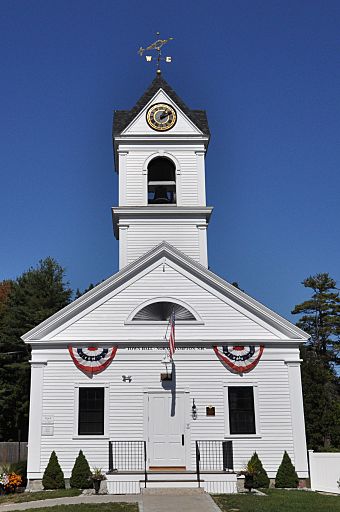North Hampton Town Hall facts for kids
|
North Hampton Town Hall
|
|
 |
|
| Location | 231 Atlantic Ave., North Hampton, New Hampshire |
|---|---|
| Area | Less than one acre |
| Built | 1844 |
| Architectural style | Greek Revival |
| NRHP reference No. | 13000006 |
Quick facts for kids Significant dates |
|
| Added to NRHP | February 13, 2013 |
The North Hampton Town Hall is a special building in North Hampton, New Hampshire. It's located at 231 Atlantic Avenue. This building was finished in 1844. It was the very first building in town made just for town meetings and government work.
Even today, it's still used for the same purpose! Inside its tower, there's a really old bell made by the famous Revere company. The Town Hall is so important that it was added to the National Register of Historic Places in 2013. It was also listed on the New Hampshire State Register of Historic Places in 2006.
What is a Town Hall?
A town hall is like the main office for a town or city. It's where local government happens. People go there to vote, get permits, or attend meetings about their community. It's a place where important decisions are made for everyone in the town.
Looking at the North Hampton Town Hall
The North Hampton Town Hall is a single-story building. It's painted white and has a special two-part tower. This tower holds the old 1816 Revere bell. In 1920, a pointed roof and a clock were added to the tower.
The building's design is called Greek Revival. This style was popular a long time ago. It has tall, flat columns called pilasters on the corners. These columns go up to a decorative band and a triangular roof section. In the middle of this triangular section, there's a half-circle window. This window is in a style called Federal.
The main entrance is in the middle of the front of the building. There are windows on each side of the door. Both the windows and the door have special, narrow decorations around them. These decorations are also in the Federal style.
A Glimpse into its History
The North Hampton Town Hall was built in 1844. Before this building, town meetings were held in a "meetinghouse." These old meetinghouses were used for both town business and church services. The new Town Hall showed that the town was growing. It needed a dedicated place for its government.
The new building was placed closer to the railroad tracks. This was a new and important part of the community. The Town Hall even used materials from older buildings! Some of the wooden beams inside came from meetinghouses built in 1734 and 1761. And, of course, the famous Revere bell used to hang in the town's second meetinghouse before finding its home here.
 | William M. Jackson |
 | Juan E. Gilbert |
 | Neil deGrasse Tyson |



